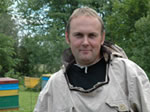
Normunds Zeps attends European Social Fund training course and is now running a successful bee-keeping business in rural Latvia.
Before he participated in an ESF-funded training course for budding business owners, Normunds Zeps was an unemployed mechanic with an interest in bees and a taste for honey. "Bees fly and collect nectar within a 3 km radius" he explains. "They need sufficient land, a clean environment and they need care."
Normunds lives in a small flat in Kalupe in rural Latvia with his wife and two sons, but the farm is 76km away in a place called Grugules. "My mother lives in that area now," he says. "It's where my family got some land when the old collective farms were privatised." Following the break-up of the Soviet Union in 1990-91, Latvia decided to bring back the small family farm. Previously state-owned collective farms were divided into parcels and citizens received credits that could be used to purchase the land.
Normunds graduated form Viski agricultural college as a machinery mechanic. "But life down here is a day-to-day struggle," he says, "and it can be very difficult to find a decent job, even when you have qualifications. Most of the time, I just stayed home and took care of the boys while my wife went to work. But I was also passionate about my beekeeping. I would have called it a hobby, really, but then I thought maybe I could develop it into a business."
Strong initiative
Showing real initiative, Normunds decided to take part in a project co-funded by the European Union through the European Social Fund. "I wanted to change my situation," he says. "I knew I had to learn more about business. This programme was offering a free training course on how to run a small enterprise, so I decided to go for it."
The ESF supports families with children who want to start businesses. In the Latvian Daugavpils district where Normunds lives, an area still struggling to overcome decades of Soviet rule, a project was launched to develop know-how in business and self-employment start-up. Course topics included developing and implementing a solid business plan.
"Basically, it was everything you need to know about starting a business," says Normunds, "and it was all free, even the study materials. Once I'd finished the course, I registered myself as a small business owner and went back to work."
"I start my day at around 6 am," he says, "I have a cup of coffee and a bite to eat and then it's an hour by car to my bees." Normunds moves cross-country, traversing some of the most beautiful landscape in southern Latvia. "This area is quite historic," he says, "There are a lot of tales to tell about this land."
Normunds looks after 28 bee 'families', following a routine that involves tending a wide swath of territory around the hives. "I cut the grass while the bees are sleeping, and I generally look after the territory. I come here three days a week. The other two days I stay at home with my boys."
Apart from the honey-makers, the Zeps farm is a one-man beehive of activity. Normunds starts early and stays late. He is working to restore some historic buildings on the property, cutting timber for a new roof for a stone barn. He also raises vegetables for family and friends in temporary hothouses he built himself. His wife and kids drop by to lend a hand when possible, but he still works largely on his own.
"We use no chemicals here," he boasts. "The bees exploit several species of flowers in this area, moving from one to another across the day and across the seasons. We are delivering a very natural and healthy product."
A growing success
Normunds now considers himself a fully fledged beekeeper, producing a tonne of high-grade honey per year, and he's working hard to expand his business. "I've got a long way to go before calling myself a successful businessman," he admits. "Providing for my family is still a struggle, but the EU has given me a good start.
"There is no question about it – when I started getting down to business I realised how useful the training course really was. Quite frankly, my life wasn't going anywhere, and this experience helped me to think in practical terms. Today we are still struggling, life remains hard, but we are making a real go of it. As far as I'm concerned, you have to keep moving forward. Has the training I received made a difference in my life? Yes, it's made a difference in all of our lives."
